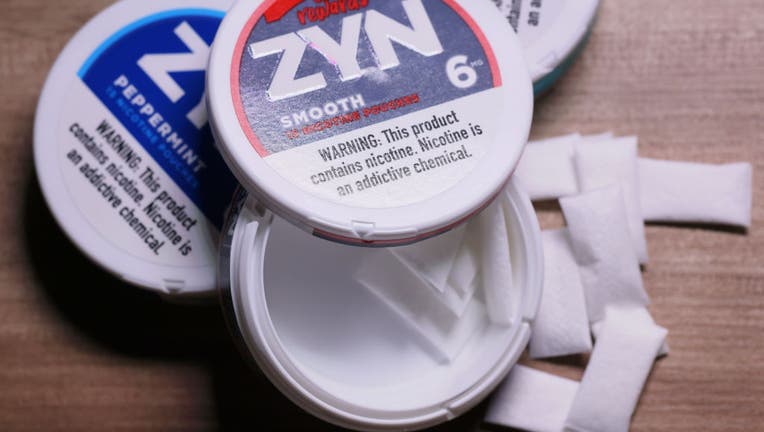What is Zyn? These nicotine pouches prompt debate

In this photo illustration, ZYN nicotine cases and pouches are seen on a table on January 29, 2024 in New York City. (Photo Illustration by Michael M. Santiago/Getty Images)
LOS ANGELES - The latest tobacco trend is splitting politicians, parents and pundits as they wrestle with the debate of alternative products being pushed by Big Tobacco companies.
Zyn, a small nicotine pouch that comes in flavors like mint, coffee and citrus is the latest trend from Philip Morris for tobacco users.
Debate over the ethics of this push comes as videos of young people popping the pouches have racked up millions of views on social media platforms.
What is Zyn?
Zyn comes in a can and costs about $5 for 15 flavored pouches which the user then puts under the lip where it’s absorbed for over an hour and then spit out.
Zyn promotions emphasize the pouches' discreet, convenient nature as a "smoke-free," "spit-free" alternative for smokers "at work" or "on the move."
Since Zyn first launched in the U.S. in 2014, sales have exploded, generating $1.8 billion this year as shipments accelerated year-over-year by over 60%.
The tobacco pouches are so popular that Zyn users have even developed their own online vocabulary, including "zynnies," "zynner" and "zynsky."
Why is it controversial?
Advocates are worried that Zyn could become the latest nicotine product that will attract underage teens in a similar way to how Juul triggered a spike in vaping among young people.
Other experts say that risk is outweighed by the potential to steer adults away from cigarettes and other traditional tobacco products, which account for 480,000 U.S. deaths annually.
"The definition of insanity is doing the same thing and expecting a different result," said Dr. Jasjit Ahluwalia, an addiction specialist at Brown University. "That is what we’ve done with tobacco for decades. We’ve been all about abstinence, instead of embracing products that can reduce harm."
Politicians have also weighed in on the controversy in the form of another skirmish in the nation’s culture war.
In late January, Democratic Sen. Charles Schumer, of New York, called on regulators to investigate Zyn, citing its appeal to teens. Several House Republicans then warned constituents that "Big Brother" intended to "ban nicotine."
Conservative pundit Tucker Carlson, a Zyn user, jumped into the fray, declaring: "Zyn is not a sin," and touting its unproven benefits, like "enhancing male vitality and mental acuity."
What the FDA says about Zyn
FDA officials have allowed Zyn to stay on the market while they review Philip Morris’ marketing application, which has been pending since 2020. If teen use remains low, the company could win FDA authorization for at least some of its offerings, which come in multiple strengths and flavors.
The Associated Press contributed to this story. It was reported from Los Angeles.

